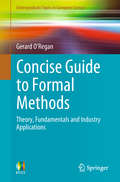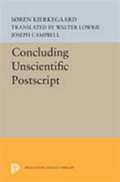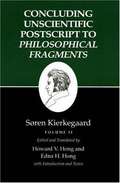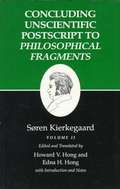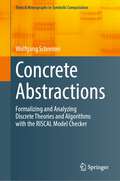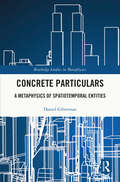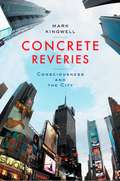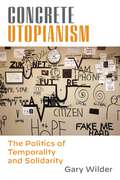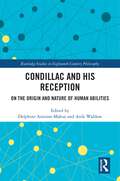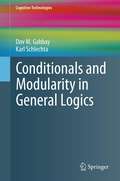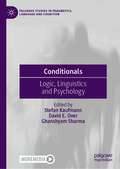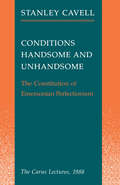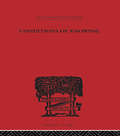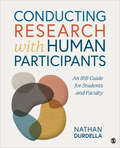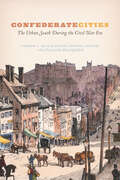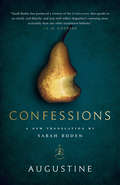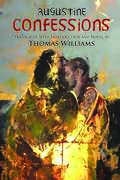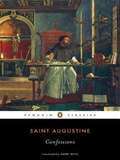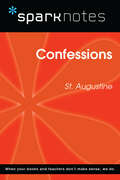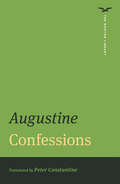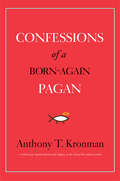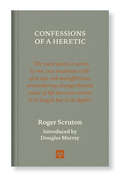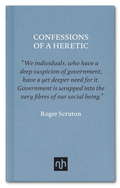- Table View
- List View
Concise Guide to Formal Methods
by Gerard O'ReganThis invaluable textbook/reference provides an easy-to-read guide to the fundamentals of formal methods, highlighting the rich applications of formal methods across a diverse range of areas of computing.Topics and features: introduces the key concepts in software engineering, software reliability and dependability, formal methods, and discrete mathematics; presents a short history of logic, from Aristotle’s syllogistic logic and the logic of the Stoics, through Boole’s symbolic logic, to Frege’s work on predicate logic; covers propositional and predicate logic, as well as more advanced topics such as fuzzy logic, temporal logic, intuitionistic logic, undefined values, and the applications of logic to AI; examines the Z specification language, the Vienna Development Method (VDM) and Irish School of VDM, and the unified modelling language (UML); discusses Dijkstra’s calculus of weakest preconditions, Hoare’s axiomatic semantics of programming languages, and the classical approach of Parnas and his tabular expressions; provides coverage of automata theory, probability and statistics, model checking, and the nature of proof and theorem proving; reviews a selection of tools available to support the formal methodist, and considers the transfer of formal methods to industry; includes review questions and highlights key topics in every chapter, and supplies a helpful glossary at the end of the book.This stimulating guide provides a broad and accessible overview of formal methods for students of computer science and mathematics curious as to how formal methods are applied to the field of computing.
Concluding Unscientific Postscript (Princeton Legacy Library #5524)
by Joseph Campbell Søren Kierkegaard Walter LowrieThe Princeton Legacy Library uses the latest print-on-demand technology to again make available previously out-of-print books from the distinguished backlist of Princeton University Press. These editions preserve the original texts of these important books while presenting them in durable paperback and hardcover editions. The goal of the Princeton Legacy Library is to vastly increase access to the rich scholarly heritage found in the thousands of books published by Princeton University Press since its founding in 1905.
Concluding Unscientific Postscripts to Philosophical Fragments (Volume I, Text)
by Howard V. Hong Edna H. Hong Søren KierkegaardIn Philosophical Fragments the pseudonymous author Johannes Climacus explored the question: What is required in order to go beyond Socratic recollection of eternal ideas already possessed by the learner? Written as an afterword to this work, Concluding Unscientific Postscript is on one level a philosophical jest, yet on another it is Climacus's characterization of the subjective thinker's relation to the truth of Christianity. At once ironic, humorous, and polemical, this work takes on the unscientific form of a mimical-pathetical-dialectical compilation of ideas. Whereas the movement in the earlier pseudonymous writings is away from the aesthetic, the movement in Postscript is away from speculative thought. Kierkegaard intended Postscript to be his concluding work as an author. The subsequent second authorship after The Corsair Affair made Postscript the turning point in the entire authorship. Part One of the text volume examines the truth of Christianity as an objective issue, Part Two the subjective issue of what is involved for the individual in becoming a Christian, and the volume ends with an addendum in which Kierkegaard acknowledges and explains his relation to the pseudonymous authors and their writings. The second volume contains the scholarly apparatus, including a key to references and selected entries from Kierkegaard's journals and papers.
Concluding Unscientific Postscripts to Philosophical Fragments (Volume II, Historical Introduction, Supplement, Notes, and Index)
by Howard V. Hong Edna H. Hong Søren KierkegaardIn Philosophical Fragments the pseudonymous author Johannes Climacus explored the question: What is required in order to go beyond Socratic recollection of eternal ideas already possessed by the learner? Written as an afterword to this work, Concluding Unscientific Postscript is on one level a philosophical jest, yet on another it is Climacus's characterization of the subjective thinker's relation to the truth of Christianity. At once ironic, humorous, and polemical, this work takes on the "unscientific" form of a mimical-pathetical-dialectical compilation of ideas. Whereas the movement in the earlier pseudonymous writings is away from the aesthetic, the movement in Postscript is away from speculative thought. Kierkegaard intended Postscript to be his concluding work as an author. The subsequent "second authorship" after The Corsair Affair made Postscript the turning point in the entire authorship. Part One of the text volume examines the truth of Christianity as an objective issue, Part Two the subjective issue of what is involved for the individual in becoming a Christian, and the volume ends with an addendum in which Kierkegaard acknowledges and explains his relation to the pseudonymous authors and their writings. The second volume contains the scholarly apparatus, including a key to references and selected entries from Kierkegaard's journals and papers.
Concrete Abstractions: Formalizing and Analyzing Discrete Theories and Algorithms with the RISCAL Model Checker (Texts & Monographs in Symbolic Computation)
by Wolfgang SchreinerThis book demonstrates how to formally model various mathematical domains (including algorithms operating in these domains) in a way that makes them amenable to a fully automatic analysis by computer software.The presented domains are typically investigated in discrete mathematics, logic, algebra, and computer science; they are modeled in a formal language based on first-order logic which is sufficiently rich to express the core entities in whose correctness we are interested: mathematical theorems and algorithmic specifications. This formal language is the language of RISCAL, a “mathematical model checker” by which the validity of all formulas and the correctness of all algorithms can be automatically decided. The RISCAL software is freely available; all formal contents presented in the book are given in the form of specification files by which the reader may interact with the software while studying the corresponding book material.
Concrete Particulars: A Metaphysics of Spatiotemporal Entities (Routledge Studies in Metaphysics)
by Daniel GibermanThis book presents a novel metaphysics of concrete entities. The author uses the theory developed to address three major topics in the metaphysics of concreta: fundamentality, persistence over time, and phenomenal consciousness.The book provides a new theory of what “bundles” particular property instances, or tropes, into material property bearers. The theory is based on two new ideas. The first is that the primitive nature of one sui generis monadic property called markedness bears on the bundling of other properties’ tropes. The second idea is that the geometric and topological features of a given markedness trope help to determine which tropes it bundles. The author argues that this new markedness bundle theory determines all property co-instantiation at the levels of both type and token, positioning markedness tropes as the fundamental concreta. The theory also explains bundling across time, yielding an advantageous account of material persistence. Finally, markedness tropes operate as de facto panprotopsychist property instances: fundamental non-consciousness tropes that uniquely explain where and why consciousness properties are exemplified. The book solidifies the case for markedness through sustained critical analysis of competing theories of fundamentality and persistence, focusing in part on their inability to account for unending mereological and plural structures.Concrete Particulars will appeal to scholars and advanced students working in metaphysics and philosophy of mind.
Concrete Reveries: Consciousness and the City
by Mark KingwellAn exploration of urbanism, personal identity, and how the space we live in shapes us<P> According to philosopher and cultural critic Mark Kingwell, the transnational global city—New York and Shanghai—is the most significant machine our species has ever produced. And yet, he says, we fail again and again to understand it. How do cities shape us, and how do we shape them? That is the subject of Concrete Reveries, which investigates how we occupy city space and why place is so important to who we are.<P> Kingwell explores the sights, smells, and forms of the city, reflecting on how they mold our notions of identity, the limits of social and political engagement, and our moral obligations as citizens. He offers a critique of the monumental architectural supermodernism in which buildings are valued more for their exteriors than for what is inside, as well as some lively writing on the significance of threshold structures like doorways, lobbies, and porches and the kinds of emotional attachments we form to ballparks, carnival grounds, and gardens. In the process, he gives us a whole new set of models and metaphors for thinking about the city.
Concrete Utopianism: The Politics of Temporality and Solidarity
by Gary WilderFinalist, 2022 Big Other Book Award for NonfictionNever before has it been more important for Left thinking to champion expansive visions for societal transformation. Yet influential currents of critical theory have lost sight of this political imperative. Provincial notions of places, periods, and subjects obstruct our capacity to invent new alignments and envision a world we wish to see. Political imagination is misread as optimism. Utopianism is conflated with idealism. Revolutionary traditions of non-liberal universalism and non-bourgeois humanism are rendered illegible. Negative critique becomes an end in itself. Pessimism is mistaken for radicalism and political fatalism risks winning the day. In this book, Gary Wilder insists that we place solidarity and temporality at the center of our political thinking. He develops a critique of Left realism, Left culturalism, and Left pessimism from the standpoint of heterodox Marxism and Black radicalism. These traditions offer precious resources to relate cultural singularity and translocal solidarity, political autonomy and worldwide interdependence. They develop modes of immanent critique and forms of poetic knowledge to envision alternative futures that may already dwell within our world: traces of past ways of being, knowing, and relating that persist within an untimely present; or charged residues of unrealized possibilities that were the focus of an earlier generation’s dreams and struggles; or opportunities for dialectical reversals embedded in the contradictory tendencies of the given order.Concrete Utopianism makes a bold case for embracing what Wilder calls a politics of the possible-impossible. Attentive to the non-identical character of places, periods, and subjects, insisting that axes of political alignment and contestation are neither self-evident nor unchanging, reworking Lenin’s call to “transform the imperial war into a civil war,” he invites Left thinkers see beyond inherited distinctions between here and there, now and then, us and them. Guided by the spirit of Marx’s call for revolutionaries to draw their poetry from a future they cannot fathom yet must nevertheless invent, he calls for practices of anticipation that envision and enact, call for and call forth, seemingly impossible ways of being together. He elaborates a critical orientation that emphasizes the dialectical relations between aesthetics and politics, political imagination and transformative practice, concrete interventions and revolutionary restructuring, past dreams and possible worlds, means of struggle and its ultimate aims. This orientation requires nonrealist epistemologies that do not mistake immediate appearances with the really real. Such epistemologies would allow critics to recognize uncanny and untimely aspects of social life, whether oppressive or potentially emancipatory. They may help actors to render the world subversively uncanny and untimely. They may clear pathways for the kind of critical internationalism and concrete utopianism that Left politics cannot afford to ignore.
Condillac and His Reception: On the Origin and Nature of Human Abilities (Routledge Studies in Eighteenth-Century Philosophy)
by Anik Waldow Delphine Antoine-MahutThis volume explores the philosophy of Étienne Bonnot de Condillac. It presents, for the first time, English-language essays on Condillac’s philosophy, making the complexity and sophistication of his arguments and their influence on early modern philosophy accessible to a wider readership. Condillac’s reflections on the origin and nature of human abilities, such as the ability to reason, reflect and use language, took philosophy in distinctly new directions. This volume showcases the diversity of themes and methods inspired by Condillac’s work. The chapters are divided into four thematic sections. Part 1 highlights themes and discussions that were central to Condillac’s own philosophical thinking, thus laying the ground for the subsequent discussions that trace Condillac’s influence in the 19th century and beyond. Part 2 focuses on the different ways in which Condillac’s philosophy has been taken up, criticised and further developed in France. Part 3 discusses thinkers working in other European countries and parts of the world who took up Condillac’s work. Finally, Part 4 looks at the practical applications of Condillac’s philosophy in a variety of different fields, such as economics, psychology, psychopathology and deaf studies. Condillac and His Reception will appeal to scholars and advanced students working on early modern philosophy, history of science and intellectual history.
Conditionals and Modularity in General Logics (Cognitive Technologies)
by Dov M. Gabbay Karl SchlechtaThis text centers around three main subjects. The first is the concept of modularity and independence in classical logic and nonmonotonic and other nonclassical logic, and the consequences on syntactic and semantical interpolation and language change. In particular, we will show the connection between interpolation for nonmonotonic logic and manipulation of an abstract notion of size. Modularity is essentially the ability to put partial results achieved independently together for a global result. The second aspect of the book is the authors' uniform picture of conditionals, including many-valued logics and structures on the language elements themselves and on the truth value set. The third topic explained by the authors is neighbourhood semantics, their connection to independence, and their common points and differences for various logics, e.g., for defaults and deontic logic, for the limit version of preferential logics, and for general approximation. The book will be of value to researchers and graduate students in logic and theoretical computer science.
Conditionals: Logic, Linguistics and Psychology (Palgrave Studies in Pragmatics, Language and Cognition)
by Stefan Kaufmann David E. Over Ghanshyam SharmaThis edited book examines conditionals from a number of interdisciplinary perspectives, drawing on research from fields as diverse as linguistics, psychology, philosophy and logic. Across 13 chapters, the authors not only investigate and examine various commonly-held perceptions about conditionals, but they also challenge many of the assumptions underpinning current conditionals scholarship, setting an agenda for future research. Based in part on the papers presented at a unique international summer school - Conditionals in Paris - this volume represents the cutting edge in the study of conditionals, and it will be of interest to scholars in fields including linguistics and psychology, semiotics, philosophy and logic, and artificial intelligence.
Conditions Handsome and Unhandsome: The Carus Lectures, 1988
by Stanley CavellIn these three lectures, Cavell situates Emerson at an intersection of three crossroads: a place where both philosophy and literature pass; where the two traditions of English and German philosophy shun one another; where the cultures of America and Europe unsettle one another. "Cavell's 'readings' of Wittgenstein and Heidegger and Emerson and other thinkers surely deepen our understanding of them, but they do much more: they offer a vision of what life can be and what culture can mean. . . . These profound lectures are a wonderful place to make [Cavell's] acquaintance."—Hilary Putnam
Conditions of Knowing: An Essay Towards a Theory of Knowledge (International Library of Philosophy)
by Angus SinclairFirst published in 2000. Routledge is an imprint of Taylor & Francis, an informa company.
Condorcet: Political Writing
by Steven Lukes Nadia Urbinati Nicolas De CondorcetNicolas de Condorcet (1743-1794), the innovating founder of mathematical thinking in politics, was the last great philosophe of the French Enlightenment and a central figure in the early years of the French Revolution. His political writings give a compelling vision of human progress across world history and express the hopes of that time in the future perfectibility of man. This volume contains a revised translation of 'The Sketch', written while in hiding from the Jacobin Terror, together with lesser-known writings on the emancipation of women, the abolition of slavery, the meanings of freedom and despotism and reflections on revolutionary violence. The introduction by Steven Lukes and Nadia Urbinati sets these works in context and shows why Condorcet is of real interest today as we reinterpret the meaning of Enlightenment, the very idea of progress and the founding ideas of social democracy.
Conducting Research with Human Participants: An IRB Guide for Students and Faculty
by Nathan Richard DurdellaConducting Research with Human Participants: An IRB Guide for Students and Faculty by Nathan Durdella is the only guidebook students and faculty will need to navigate the IRB process and secure swift approval of research protocols. This book serves as an advisor to walk researchers through all the details of drafting, submission, and revision of materials for Institutional Review Boards so they can complete their research projects or dissertations faster. This text walks readers through the history of Institutional Review Boards, the contemporary context of ethical research, strategies to effectively draft, submit, and revise an IRB protocol, and guidance on working with an approved protocol in the field. The latest updates to the Common Rule and other regulatory frameworks, including special protections for working with vulnerable groups, are covered throughout the text. Not every research project goes according to plan, so adverse events and reporting receive special coverage. A final chapter on ethical research practices beyond IRB compliance encourages researchers to think through how to exit the field of research and ensure their research benefits the individuals, families, and communities in which they work. Take the guesswork out of the IRB process from start to finish with this handy guide.
Conducting Research with Human Participants: An IRB Guide for Students and Faculty
by Nathan Richard DurdellaConducting Research with Human Participants: An IRB Guide for Students and Faculty by Nathan Durdella is the only guidebook students and faculty will need to navigate the IRB process and secure swift approval of research protocols. This book serves as an advisor to walk researchers through all the details of drafting, submission, and revision of materials for Institutional Review Boards so they can complete their research projects or dissertations faster. This text walks readers through the history of Institutional Review Boards, the contemporary context of ethical research, strategies to effectively draft, submit, and revise an IRB protocol, and guidance on working with an approved protocol in the field. The latest updates to the Common Rule and other regulatory frameworks, including special protections for working with vulnerable groups, are covered throughout the text. Not every research project goes according to plan, so adverse events and reporting receive special coverage. A final chapter on ethical research practices beyond IRB compliance encourages researchers to think through how to exit the field of research and ensure their research benefits the individuals, families, and communities in which they work. Take the guesswork out of the IRB process from start to finish with this handy guide.
Confederate Cities: The Urban South during the Civil War Era (Historical Studies of Urban America)
by Andrew L. Slap Frank TowersWhen we talk about the Civil War, we often describe it in terms of battles that took place in small towns or in the countryside: Antietam, Gettysburg, Bull Run, and, most tellingly, the Battle of the Wilderness. One reason this picture has persisted is that few urban historians have studied the war, even though cities hosted, enabled, and shaped Southern society as much as they did in the North. Confederate Cities, edited by Andrew L. Slap and Frank Towers, shifts the focus from the agrarian economy that undergirded the South to the cities that served as its political and administrative hubs. The contributors use the lens of the city to examine now-familiar Civil War-era themes, including the scope of the war, secession, gender, emancipation, and war's destruction. This more integrative approach dramatically revises our understanding of slavery's relationship to capitalist economics and cultural modernity. By enabling a more holistic reading of the South, the book speaks to contemporary Civil War scholars and students alike--not least in providing fresh perspectives on a well-studied war.
Confessions
by Sarah Ruden AugustineOne of the great works of Western literature, from perhaps the most important thinker of Christian antiquity, in a revolutionary new translation by one of today’s leading classicists Sarah Ruden’s fresh, dynamic translation of Confessions brings us closer to Augustine’s intent than any previous version. It puts a glaring spotlight on the life of one individual to show how all lives have meaning that is universal and eternal. In this intensely personal narrative, Augustine tells the story of his sinful youth and his conversion to Christianity. He describes his ascent from a humble farm in North Africa to a prestigious post in the Roman Imperial capital of Milan, his struggle against his own overpowering sexuality, his renunciation of secular ambition and marriage, and the recovery of the faith his mother had taught him during his earliest years. Augustine’s concerns are often strikingly contemporary, and the confessional mode he invented can be seen everywhere in writing today. Grounded in her command of Latin as it was written and spoken in the ancient world, Sarah Ruden’s translation is a bold departure from its predecessors—and the most historically accurate translation ever. Stylistically beautiful, with no concessions made to suit later theology and ritual, Ruden’s rendition will give readers a startling and illuminating new perspective on one of the central texts of Christianity.Praise for Sarah Ruden “Ruden’s work emphasizes the complexity inherent in translation; she lingers on some of the most challenging concepts and explicates the historical and linguistic context for her work, debunking both myths and poor prior interpretations.”—Publishers Weekly (starred review), on The Face of Water “The best translation yet, certainly the best of our time.”—Ursula K. Le Guin, on The Aeneid “An Aeneid more intimate in tone and soberer in measure than we are used to—a gift for which many will be grateful.”—J. M. Coetzee, on The Aeneid
Confessions
by Augustine"Williams's masterful translation satisfies (at last!) a long-standing need. There are lots of good translations of Augustine's great work, but until now we have been forced to choose between those that strive to replicate in English something of the majesty and beauty of Augustine's Latin style and those that opt instead to convey the careful precision of his philosophical terminology and argumentation. Finally, Williams has succeeded in capturing both sides of Augustine’s mind in a richly evocative, impeccably reliable, elegantly readable presentation of one of the most impressive achievements in Western thought—Augustine's Confessions." —Scott MacDonald, Professor of Philosophy and Norma K. Regan Professor in Christian Studies, Cornell University
Confessions
by Garry Wills Augustine Of HippoGarry Wills is an exceptionally gifted translator and one of our finest writers on religion. His bestselling Penguin Lives biography, Saint Augustine, received widespread and glowing reviews, many of which noted his masterful translations of the famed fourth- century bishop's works. Now, reading with fresh, keen eyes, Wills applies his unparalleled talents and his superb gifts of analysis and insight to this ambitious and complete translation of Saint Augustine's Confessions. Removed by time and place but not by spiritual relevance, Confessions is one of the most resonant texts in the Western canon, and continues to influence contemporary religion, languages, and thought.
Confessions (SparkNotes Philosophy Guide)
by SparkNotesConfessions (SparkNotes Philosophy Guide) Making the reading experience fun! SparkNotes Philosophy Guides are one-stop guides to the great works of philosophy–masterpieces that stand at the foundations of Western thought. Inside each Philosophy Guide you&’ll find insightful overviews of great philosophical works of the Western world.
Confessions (The Norton Library #0)
by AugustineAbout Peter Constantine’s translation “There are times when Augustine seems all too self-consciously in control of his performance, but there are moments when the role of penitent sinner turned ecstatic worshipper ceases to be a role and becomes simply the naked truth of the man himself. The deep strength of Peter Constantine’s translation is that he has matched Augustine’s sincerity with his own.” —JACK MILES, author of God: A Biography
Confessions of a Born-Again Pagan
by Anthony T. KronmanIn this passionate and searching book, Anthony Kronman offers a third way--beyond atheism and religion--to the God of the modern world "An astonishing, . . . epically ambitious book. . . . An intellectual adventure story based on the notion that ideas drive history, and that to dedicate yourself to them is to live a bigger, more intense life. "--David Brooks, New York Times We live in an age of disenchantment. The number of self-professed "atheists" continues to grow. Yet many still feel an intense spiritual longing for a connection to what Aristotle called the "eternal and divine. " For those who do, but demand a God that is compatible with their modern ideals, a new theology is required. This is what Anthony Kronman offers here, in a book that leads its readers away from the inscrutable Creator of the Abrahamic religions toward a God whose inexhaustible and everlasting presence is that of the world itself. Kronman defends an ancient conception of God, deepened and transformed by Christian belief--the born-again paganism on which modern science, art, and politics all vitally depend. Brilliantly surveying centuries of Western thought--from Plato to Augustine, Aquinas, and Kant, from Spinoza to Nietzsche, Darwin, and Freud--Kronman recovers and reclaims the God we need today.
Confessions of a Heretic, Revised Edition: Selected Essays
by Roger ScrutonA revised edition of the Notting Hill Editions essay collection by the late Sir Roger Scruton with a new introduction by Douglas Murray.Confessions of a Heretic is a collection of provocative essays by the influential social commentator and polemicist Roger Scruton. Each &“confession&” reveals aspects of the author&’s thinking that his critics would probably have advised him to keep to himself. In this selection, covering subjects from art and architecture to politics and nature conservation, Scruton challenges popular opinion on key aspects of our culture: What can we do to protect Western values against Islamist extremism? How can we nurture real friendship through social media? Why is the nation-state worth preserving? How should we achieve a timely death against the advances of modern medicine? This provocative collection seeks to answer the most pressing problems of our age.In his introduction, the bestselling author and commentator Douglas Murray writes of what it cost Scruton to express views considered unpalatable, and of the importance of these ideas after Scruton&’s death.
Confessions of a Heretic: Selected Essays
by Roger ScrutonHard-hitting essays by acclaimed social commentator and philosopher Roger Scruton, guaranteed to provoke lively debateA wide-ranging selection that includes essays on architecture and modern art, the environment, politics, and culture.Each “confession” reveals aspects of the author’s thinking that his critics would probably have advised him to keep to himself. Roger Scruton challenges popular opinion on key aspects of our society: What can we do to protect Western values against Islamic extremism? How can we nurture real friendship in the digital age of social media and Facebook? How should we achieve a timely death against the advances of modern medicine? How should environmental policies be shaped by the government? This provocative collection seeks to answer the most pressing problems of our age.
